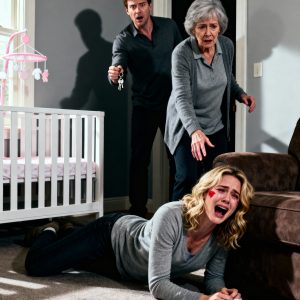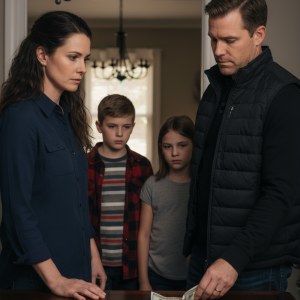I’ve loved my husband, Adam, through every stumble—two layoffs, the shaky birth of his start‑up, the slow climb toward stability. What I didn’t expect was fighting for my marriage against his mother, Denise.
From the first handshake, Denise made it clear I wasn’t “good enough.” She favored silk scarves and country‑club gossip; I wore thrift‑store denim and dreamed in spreadsheets.
When Adam and I eloped instead of staging the society wedding she envisioned, she practically erased us from the family group chat.
Our son’s birth seemed to thaw her frost—for exactly one visit. She cooed over the baby, left behind a pastel blanket, then vanished into radio silence.
Weeks later, after we’d settled our newborn for the night, Adam sat beside me, shoulders drawn tight. “Mom thinks we should do a paternity test,” he blurted.
He rattled off excuses—some article about paternity fraud, “just clearing the air.” I asked one question: “Do you believe we need one?” His hesitation sliced deeper than any accusation.
My pulse slowed to ice, but my voice stayed level. “Fine,” I said. “We’ll test our son—if we also confirm you’re your father’s biological child.”
Adam’s jaw unhinged. “You’re serious?” he whispered. I matched his stare. “Exactly as serious as your mother calling me a liar.”
The baby’s cheek swab was simple. Collecting Adam’s dad’s DNA required creativity: a family dinner, a “prototype” eco‑toothbrush, and a discreet Ziploc bag afterward.
We mailed both kits the next morning, then waited through sleepless nights and diaper‑filled days.
Our son’s first birthday arrived: rainbow balloons, smash cake, close friends only. Denise perched on the sofa, wine glass in hand, pretending nothing was amiss.
As confetti settled, I produced the first envelope. “Since doubts were raised,” I began, “here are the results.” I read aloud: Adam—99.9 % probability of paternity.
Denise’s satisfied smile barely formed before Adam opened the second envelope. His voice cracked: “Dad… the test says I’m not biologically yours.”
Silence detonated. Denise lunged to snatch the paper, but Adam stepped between them. “The only liar in this room was the one pointing fingers,” he said.
His father set down his fork, picked up his keys, and walked out without a word. Denise collapsed into her chair, tears carving mascara tracks.
In the days that followed, voicemail after voicemail bled through my phone—Denise pleading, justifying, bargaining. We answered none.
Anger wasn’t my only companion; betrayal was louder. Adam had doubted me. Therapy became our neutral ground, where I told him, “I felt alone in a room full of family.”
He owned his cowardice, promised to rebuild trust brick by brick. I watched him enforce boundaries: shutting down backhanded comments at reunions, choosing my side without hesitation.
Eventually, forgiveness found me—not because the memory faded, but because Adam changed.
Denise, still unrepentant, stayed blocked. Adam’s dad filed for divorce and began visiting his grandson weekly, piling our living room with picture books and laughter.
Life galloped on—first steps, first words, sticky fingers on the fridge door. The envelopes lie in a desk drawer, untouched. We already know our truth.
Our family isn’t defined by blood tests or whispered doubts. It’s shaped by who shows up, who stays, and who chooses love over rumors.





